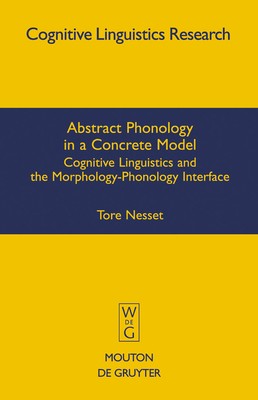
- We will send in 10–14 business days.
- Author: Tore Nesset
- Publisher: Walter de Gruyter
- Year: 2008
- Pages: 250
- ISBN-10: 3110203618
- ISBN-13: 9783110203615
- Format: 16 x 23.4 x 1.8 cm, hardcover
- Language: English
- SAVE -10% with code: EXTRA
Reviews
Description
This book is relevant for phonologists, morphologists, Slavists and cognitive linguists, and addresses two questions: How can the morphology-phonology interface be accommodated in cognitive linguistics? Do morphophonological alternations have a meaning? These questions are explored via a comprehensive analysis of stem alternations in Russian verbs. The analysis is couched in R.W. Langacker's Cognitive Grammar framework, and the book offers comparisons to other varieties of cognitive linguistics, such as Construction Grammar and Conceptual Integration. The proposed analysis is furthermore compared to rule-based and constraint-based approaches to phonology in generative grammar.
Without resorting to underlying representations or procedural rules, the Cognitive Linguistics framework facilitates an insightful approach to abstract phonology, offering the important advantage of restrictiveness. Cognitive Grammar provides an analysis of an entire morphophonological system in terms of a parsimonious set of theoretical constructs that all have cognitive motivation. No ad hoc machinery is invoked, and the analysis yields strong empirical predictions. Another advantage is that Cognitive Grammar can identify the meaning of morphophonological alternations. For example, it is argued that stem alternations in Russian verbs conspire to signal non-past meaning.
This book is accessible to a broad readership and offers a welcome contribution to phonology and morphology, which have been understudied in cognitive linguistics.
EXTRA 10 % discount with code: EXTRA
The promotion ends in 9d.16:45:31
The discount code is valid when purchasing from 10 €. Discounts do not stack.
- Author: Tore Nesset
- Publisher: Walter de Gruyter
- Year: 2008
- Pages: 250
- ISBN-10: 3110203618
- ISBN-13: 9783110203615
- Format: 16 x 23.4 x 1.8 cm, hardcover
- Language: English English
This book is relevant for phonologists, morphologists, Slavists and cognitive linguists, and addresses two questions: How can the morphology-phonology interface be accommodated in cognitive linguistics? Do morphophonological alternations have a meaning? These questions are explored via a comprehensive analysis of stem alternations in Russian verbs. The analysis is couched in R.W. Langacker's Cognitive Grammar framework, and the book offers comparisons to other varieties of cognitive linguistics, such as Construction Grammar and Conceptual Integration. The proposed analysis is furthermore compared to rule-based and constraint-based approaches to phonology in generative grammar.
Without resorting to underlying representations or procedural rules, the Cognitive Linguistics framework facilitates an insightful approach to abstract phonology, offering the important advantage of restrictiveness. Cognitive Grammar provides an analysis of an entire morphophonological system in terms of a parsimonious set of theoretical constructs that all have cognitive motivation. No ad hoc machinery is invoked, and the analysis yields strong empirical predictions. Another advantage is that Cognitive Grammar can identify the meaning of morphophonological alternations. For example, it is argued that stem alternations in Russian verbs conspire to signal non-past meaning.
This book is accessible to a broad readership and offers a welcome contribution to phonology and morphology, which have been understudied in cognitive linguistics.


Reviews